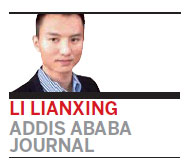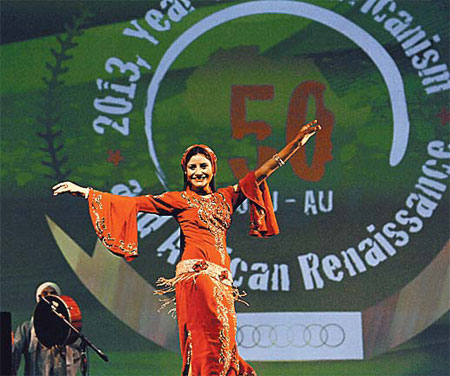Organization seeks greater economic independence
|
A Egyptian dancer performs on Saturday during the African Union's 50th anniversary in Addis Ababa, Ethiopia. Simon Maina / Agence France-Presse |

In the conference hall of the grand African Union building, Turkey has a counter to promote its city of Izmir as a candidate to host Expo 2020, and it attracted a large crowd. Japanese Prime Minister Shinzo Abe's congratulatory message had been printed out and circulated in the media center several days before the AU summit. Chinese technicians in uniform were standing by in different conference rooms to ensure that the operation of the entire building complex, built with aid from the Chinese government, was impeccable.
Standing at the Golden Jubilee of the AU, this organization and its people continue to seek to diversify their global partners and try to stand on the world stage on their own.
Throughout the celebration of its 50th birthday, the AU has been stressing this year's theme "Pan-Africanism and African Renaissance", which is echoing the founding spirit of this organization, and more importantly, striving to find a way to reach its full independence in the next 50 years. Although most African countries have gained independence since the 1950s and 1960s, the logic behind the diversification of partnership at this stage is to achieve a real independence, especially economic. Foreign aid from traditional donors has been a two-edged sword in many African countries that on one hand gives financial support to its development but also restricts the mobility and sustainability of countries on the other.
The AU cannot avoid this issue. This year will be a celebration year for the AU, and many events and relative activities have been and will be organized to commemorate this historic moment. To cover all the expenses and ensure the normal operation of the giant continental organization, a total $308 million is expected as the budget for the year, despite the heavy deficit of this year.
According to the deputy chairperson of the AU Commission, Erastus Mwencha, the AU currently receives 42 percent of its total funding from foreign donors, and the continent itself is sourcing the rest.
"It's not possible that the partners will always align themselves to your priorities. Partners have got their biases," he said. "You can't have that as a sustainable source because no partner is going to say that in the next five years, we will guarantee this amount."
He said Africa's priorities do not match those of the traditional donors, so relying on external funding resources poses a challenge to the organization and its member countries in the long term.
"Resources now are very difficult to come by, and we know that the global economy is undergoing a crisis, even as some partners continue to give their commitments that they will honor and continue to support development. But Africa should be conscious regarding this challenge and doing everything to diversify and work not only with multiple partners, but also shift to domestic resources."
(China Daily 05/27/2013 page10)















